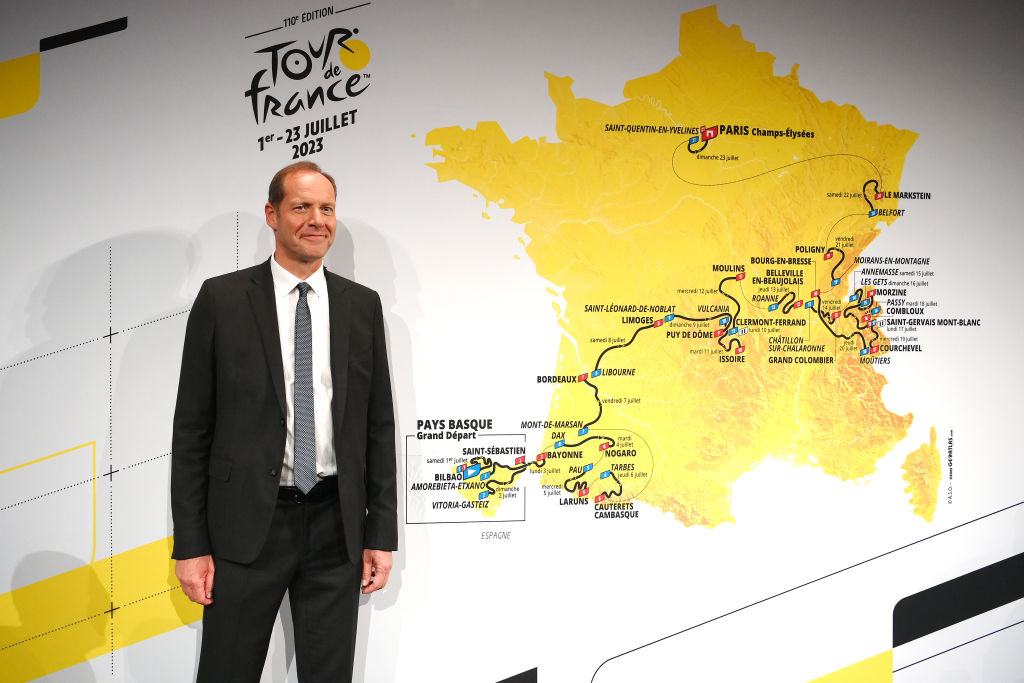'It would paralyse the race' – Prudhomme defends lack of time trialling in 2023 Tour de France
Race director argues that duality between climbers and rouleurs is a thing of the past

Christian Prudhomme has issued a passionate defence of the lack of time trialling in the route for the 2023 Tour de France, arguing that current trends in cycling make the discipline a threat to the excitement of the race.
The Tour de France director took to the stage in Paris' Palais des Congrès on Thursday to unveil a route that will pass through all five of France's mountain range but only rack up 22 kilometres against the clock.
That effectively amounts to the lightest helping of time trialling in the Tour's modern-day history. Prudhomme tried to point out that the 2015 Tour had less, but his observation failed to acknowledge the 28km mid-race team time trial of that year.
What's more, the 2023 Tour's only time trial takes place in the mountains and features the steep climb of the Côte de Domancy.
"Time trials have the tendency to paralyse the race," Prudhomme told reporters in Paris.
"I prefer to see the champions shoulder-to-shoulder from the first weekend. You all know that very well too. A shoulder-to-shoulder battle is much better than riders having their times taken one after the other."
Prudhomme based his argument on the current style of the world's leading riders, noting a new generation of all-rounders. Today's pure climbers may still bleed time against the clock, but in last year's Tour the top time triallists - Jonas Vingegaard (Jumbo-Visma) and Tadej Pogačar (UAE Team Emirates) - were also the top climbers.
Get The Leadout Newsletter
The latest race content, interviews, features, reviews and expert buying guides, direct to your inbox!
"When I was little, we used to have a duality between climbers and time triallists, an opposition of styles," Prudhomme argued.
"You'd have a Jacques Anquetil who was a super rouleur but suffered in the mountains, and then The Eagle of Toledo, Federico Bahamontes, who impacted in the mountains but lost time against the clock. That's when you have to put time trials in, because the styles would balance out.”
"Now, we're back in an attacking kind of cycling, with riders capable of winning almost anywhere."
In the record absence of time trialling comes a record helping of climbing, with 30 categorised ascents on the menu for 2023, starting in the hilly Basque Country and then covering all of France's mountain ranges: the Pyrenees, Massif Central, Jura, Alps and Vosges.
After the punchy opening days in Spain, there's a relatively light helping of Pyrenean climbs before the hotly-anticipated return to the iconic Puy de Dome summit finish on stage 9. The second week sees a second summit finish on the Grand Colombier in the Jura before a heavy serving of Alps, with a finish at Morzine and another summit finish at Le Bettex preceding the final rest day.
The second week opens with that time trial before the hardest day of the Tour comes on stage 17, with over 5000 metres of climbing and a finale over the high-altitude Col de la Loze. The race then heads up to the Vosges for it's finale on a rugged parcours that culminates at Markstein after a stinging 7km climb.
"The Tour is always made for climbers, no matter what anyone says. If you can't climb well, you cannot win the Tour de France," Prudhomme said.
"I dream of having, like 60 years ago, a true face-off between the pure rouleurs who try to hang on in the mountains and the great climbers who aren't good against the watch. That's not the case now, but it might happen again."
Patrick is a freelance sports writer and editor. He’s an NCTJ-accredited journalist with a bachelor’s degree in modern languages (French and Spanish). Patrick worked full-time at Cyclingnews for eight years between 2015 and 2023, latterly as Deputy Editor.
